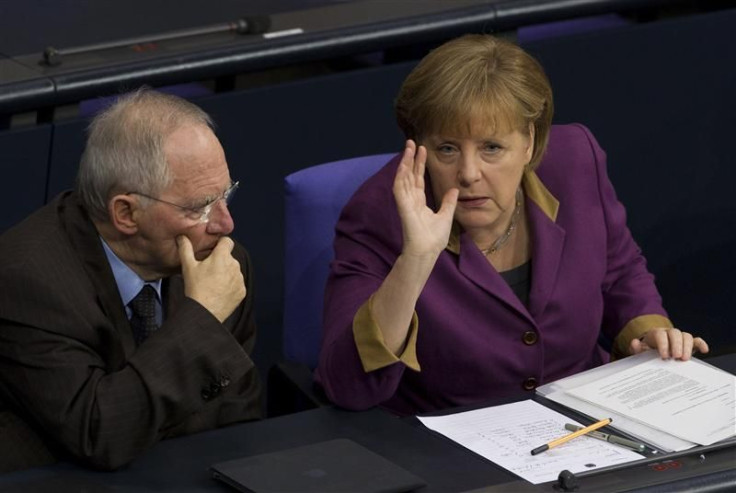German Court Deals Setback to Europe Bailout Effort

KARLSRUHE, Germany (REUTERS) -- Germany's top court said Tuesday that a parliamentary panel set up to approve urgent action by the euro zone bailout fund is in large part unconstitutional, in a ruling that may hamper Berlin's ability to tackle Europe's debt crisis.
In the second sign in two days of Chancellor Angela Merkel's shrinking political room for maneuver in the euro crisis -- she only narrowly mustered her own majority in Monday's vote on a new Greek bailout -- the Constitutional Court demanded fuller consultation of lawmakers.
The verdict means either a full session of the 620-strong Bundestag, the lower house of parliament, or its powerful 41-member budget committee will have to be convened each time a decision has to be made on the use of the euro zone's bailout fund.
The special panel of nine MPs, which meets in secret, will only be allowed to approve the purchase of debt on the secondary bond market by the fund - a facility that has not been used anyway. It cannot approve loans or precautionary credit lines for troubled euro member states like Greece or the capitalization of banks.
The red-robed president of the court in Karlsruhe, Andreas Vosskuhle, cited the need to guarantee as much parliamentary legitimization as possible in upholding a complaint by two opposition MPs that the panel infringed the basic right of lawmakers to decide on budgetary matters.
The smaller the size of the committee, the less representative it is, said fellow judge Peter Huber.
Finance Minister Wolfgang Schaeuble had urged the court to leave intact the powers of the special parliamentary panel, warning that the European Financial Stability Facility's, or EFSF's, ability to act with the requisite speed might be harmed.
His deputy Steffan Kampeter told reporters the verdict would reinforce the budget committee's role as the finance ministry's point of contact on bailouts, while letting the panel decide on bond buying was an important signal to capital markets.
The ruling will not affect Monday's decision by the Bundestag to approve a second, 130-billion-euro ($174 billion) bailout package for Greece.
But that vote showed that lawmakers, like the public, are tiring of having to keep making new commitments to bail out the likes of Greece, Portugal and Ireland, and object to their powers over such budget-related issues being curtailed.
This should be a lesson for parliamentary floor leaders to think these things through, said Peter Danckert, one of two MPs from the opposition Social Democrats who filed the complaint.
The ruling gives more power to parliament, Volker Beck of the opposition Greens told reporters at the courthouse.
Norbert Lammert, the speaker of the Bundestag from Merkel's Christian Democrats who is a strong defender of parliamentary control, welcomed the ruling as logical and convincing.
In terms of atmosphere it's not good when the population think there is a small panel that can make enormous decisions that the taxpayer will later have to pay for, said economic policy professor Manfred Neumann of Bonn University.
With Merkel's ability to pass legislation on the euro crisis increasingly at risk -- 17 MPs from her center-right coalition rebelled against the Greek package on Monday, up from 13 who defied her in a vote on the bailout fund last September -- the panel would have given her more room for maneuver.
It was set up to take urgent decisions on behalf of the powerful Bundestag budget committee when it comes to especially urgent or confidential matters.
Tuesday's ruling will apply not only to the current temporary bailout fund, the European Financial Stability Facility, but also to its permanent successor, the European Stability Mechanism, or ESM, a court official said.
In light of the ruling we will also examine the legislative proposal for the European Stability Mechanism, said Kampeter.
While there is growing resistance among German voters to further bailout spending, pressure is also mounting on Berlin from the world's leading economies to drop its opposition to boosting the ESM in order to free up more international help.
Former German chancellor Helmut Kohl, one of the architects of the euro, warned in the popular daily Bild that Germany was in danger of losing sight of the goal of a united Europe.($1 = € 0.7466)
(Additional reporting by Diana Niedernhoefer, Berlin Newsroom; Writing by Stephen Brown and Gareth Jones; editing by Janet McBride and Paul Taylor)
© Copyright Thomson Reuters 2024. All rights reserved.











